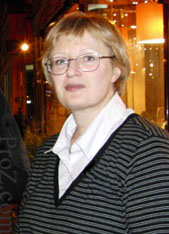| Pages in topic: [1 2 3 4 5 6 7] > | Are general translators capable of translating highly specialized medical texts Thread poster: LilianNekipelov
|
|---|
Do you believe that general translators, even if they claim that they have some medical translation experience, are capable of translating highly specialized medical texts, especially texts related to medical research and finding new ways of treatment of certain devastating diseases and testing of new medications? These texts are written by university professors -- top in the field, and often they are being translated by people who have almost nothing to do with medicine. What is the problem? Ar... See more Do you believe that general translators, even if they claim that they have some medical translation experience, are capable of translating highly specialized medical texts, especially texts related to medical research and finding new ways of treatment of certain devastating diseases and testing of new medications? These texts are written by university professors -- top in the field, and often they are being translated by people who have almost nothing to do with medicine. What is the problem? Are we just wasting thousands and years of research, to save a few bucks? Who should translate such texts in your opinion. This is really alarming, I think. ▲ Collapse
| | | | XXXphxxx (X) 
United Kingdom
Local time: 11:55
Portuguese to English
+ ...
Isn't this a rhetorical question? Who are you expecting to disagree with you?
| | | | | NOOOOOOOOOO !!!!!!!!!!!!!!! | Jul 13, 2012 |
Hi Lilian,
I say a big NO, particularly right now, when I am reviewing (please understand re-translating / re-writing) a so-called medical "translation". Not a very highly specialized one, no, just the SPC of a very simple veterinary anti-infectious agent. Incredible.
You are right, with their obsession with saving some cents, clients are becoming dangerous to our health, and to the animals one too.
We should gather and organize ourselves in order to ale... See more Hi Lilian,
I say a big NO, particularly right now, when I am reviewing (please understand re-translating / re-writing) a so-called medical "translation". Not a very highly specialized one, no, just the SPC of a very simple veterinary anti-infectious agent. Incredible.
You are right, with their obsession with saving some cents, clients are becoming dangerous to our health, and to the animals one too.
We should gather and organize ourselves in order to alert the pharma Industry.
Catherine ▲ Collapse
| | | | | Lisa is right | Jul 13, 2012 |
This discussion may be pointless as the subject has already been discussed at length under the same or similar name.
Those who aren't doctors, engineers, you name it, will say that they can do it and the opposite party will say that the other cannot do it as well as they would.
I do medical translations and undertake projects I am fully confident I can handle. I also cooperate with a doctor who acts as my proofreader, so I think if someone commissions a medical translation to me, ... See more This discussion may be pointless as the subject has already been discussed at length under the same or similar name.
Those who aren't doctors, engineers, you name it, will say that they can do it and the opposite party will say that the other cannot do it as well as they would.
I do medical translations and undertake projects I am fully confident I can handle. I also cooperate with a doctor who acts as my proofreader, so I think if someone commissions a medical translation to me, they are not wasting their money.
I will just tell you that one of my uni professors (she) of translation studies has nothing to do with medicine and she is a top-notch medical translator booked for another 3 months or so.
Just my 2 cents.
Maja ▲ Collapse
| | |
|
|
|
| Absolute no medical background and knowledge NO but with medical background/knowledge YES | Jul 13, 2012 |
LilianBoland wrote:
Do you believe that general translators, even if they claim that they have some medical translation experience, are capable of translating highly specialized medical texts, especially texts related to medical research and finding new ways of treatment of certain devastating diseases and testing of new medications? These texts are written by university professors -- top in the field, and often they are being translated by people who have almost nothing to do with medicine. What is the problem? Are we just wasting thousands and years of research, to save a few bucks? Who should translate such texts in your opinion. This is really alarming, I think.
I made a change in the title of my post, because I didn't read this part of your post:
"...they are being translated by people who have almost nothing to do with medicine."
Then my answer is NO!
But actually sometimes medical or science professionals do not know anything about excellent and accurate translation. First of all we have to think about the 2 professions themselves. Why did a doctor choose to be a doctor? To cure people. Why did a translator became a translator? To "interpret" texts into other languages. 2 very different professions. Translation is in the category of humanities, and medical/biology fields are sciences. Very different skills are needed. But the main profession skill what is needed for a translator is being a linguist: understanding texts and then being able to interpret them fluently and accurately into other language(s) without significant changes. A medical translator who has a deep knowledge in medical/pharmaceutical fields but who is not a doctor is able to do that. Just as medical writing is done many times by journalists specialized in medical texts.
As we all know knowing 2 or more languages and being an expert in a field does not mean that somebody is a translator in that field. You have have that special "translation skill". I have seen thousands times when medical or science professionals started to rewrite the texts and articles they received for translation (with significant modifications). This is a big mistake. Or they were experts in this or in that field so they didn't look up the acronyms ('I know that ' - dangerous routine) but they used the acronyms that were close to their fields but those acronyms didn't match into that context (this means they didn't understand the text). Many times translation is an extra money for them, so they are working for low rates and some of them do not know the rules of translation. There are exceptions. Mainly those medical experts are exceptions who are not practicing as doctors any more and they do not look at translation as extra $$$$ but they are full-time translators since many years and they also learned how to be a good translator: if they have never heard about something, they do a research, they do not act as authors but as translators and they do not change the source text significantly. Actually many times university professors or doctors themselves are working as translators (because they cannot live from their own salaries) and I have no problem with that if
1) they act as professional translators
2) they do not ruin the market with their low rates
3) they know how to translate (to create fluent texts)
4) they know the rules of translation
5) they do research if it is needed (working only from routine in translation is a dangerous thing since medical translation is full of innovative things)
6) they are technically advanced
So if the 2 skills (excellent translation skills + medical knowledge) are combined, your (or the client's text) is in the right hands.
[Edited at 2012-07-13 14:35 GMT]
| | | | Robert Forstag 
United States
Local time: 06:55
Spanish to English
+ ...
| It really depends on the difficulty of the text in question | Jul 13, 2012 |
There is such a high degree of variability regarding the difficulty of medical texts that, at least in my view, it is impossible to give a general answer to Lilian's question. In the end, the same rule of thumb applies to medical translation as to any other translation: If you are sufficiently comfortable with the subject matter as to accurately translate the text using a combination of acquired knowledge and sources at your disposal, and with no more than a minimum of direct external help (e.g... See more There is such a high degree of variability regarding the difficulty of medical texts that, at least in my view, it is impossible to give a general answer to Lilian's question. In the end, the same rule of thumb applies to medical translation as to any other translation: If you are sufficiently comfortable with the subject matter as to accurately translate the text using a combination of acquired knowledge and sources at your disposal, and with no more than a minimum of direct external help (e.g., posting term help queries and asking colleagues for assistance), then you are qualified to do the translation (assuming that you also have the basic qualifications in terms of knowledge of the source and target languages--an obvious point, but something that can't necessarily be taken for granted in these parts).
I myself do not specialize in medical translation, but a short time ago I translated a long series of documents involving the indications, contraindications, and side effects for a particular medication. I did not have any difficulty with this project in terms of the criteria I've suggested above. Had this not been the case, I would have refused the work.
I would add that those assigning such projects have the responsibility to appreciate the difficulty of the text they are assigning, and to impose requirements accordingly in order to assure accurate translation.
[Edited at 2012-07-13 15:09 GMT] ▲ Collapse
| | | | Tom in London
United Kingdom
Local time: 11:55
Member (2008)
Italian to English
| They don't exist | Jul 13, 2012 |
LilianBoland wrote:
Do you believe that general translators.....
I don't believe there's such a thing as a "general translator", i.e. a translator who can translate anything, or everything.
| | | | LilianNekipelov 
United States
Local time: 06:55
Russian to English
+ ...
TOPIC STARTER | It might be a slightly rhetorical question, Lisa, but it is still worth addressing | Jul 13, 2012 |
I personally think that more complex medical texts, such as academic papers and research on new treatments should be done only by doctors. Other slightly less complex texts, such as accident medical reports, some medical records needed mostly to establish disability could be translated by professional translators with extensive experience in the medical field, under the supervision of a doctor. As to texts related to new treatments, I don't think anyone except a doctor specializing in that parti... See more I personally think that more complex medical texts, such as academic papers and research on new treatments should be done only by doctors. Other slightly less complex texts, such as accident medical reports, some medical records needed mostly to establish disability could be translated by professional translators with extensive experience in the medical field, under the supervision of a doctor. As to texts related to new treatments, I don't think anyone except a doctor specializing in that particular medical field should be doing it, and even then it should be done under the supervision of the researcher.
The other alternative would be machine translation, just kidding.
Ok, Tom, I am sorry, more a literary translator, or a social sciences translator, someone with just philological and general background -- someone who translates newspaper articles. It is hard to define what I had in mind. It was definitely someone who is perhaps a good translator but who is not a doctor, a PA (in the US) or a Registered Nurse familiar with clinical trials. I did some medical translations myself, mostly medical reports, related to accident injuries for disability of compensation purposes, but I would never ever attempt translating anything related to medical research, or things on which someone's life depended. I think it is better if the text does not have perfect style, or a few grammatical errors, even, as long as the message is accurately conveyed.
[Edited at 2012-07-13 15:16 GMT] ▲ Collapse
| | |
|
|
|
| Same dilemma :) | Jul 13, 2012 |
Tom in London wrote:
LilianBoland wrote:
Do you believe that general translators.....
I don't believe there's such a thing as a "general translator", i.e. a translator who can translate anything, or everything.
Actually first I wrote 'YES' to Lilian's question because I skipped this part "they are being translated by people who have almost nothing to do with medicine".
Then of course I wrote 'NO'. And now I have just had the same dilemma:
Who is a general translator? My first thought was literature translators, but literature (like translating books) is also a specialization field. I think Lilian meant as translators who are translating easy texts written for everyday people...
| | | | Natalie 
Poland
Local time: 12:55
Member (2002)
English to Russian
+ ...
Moderator of this forum SITE LOCALIZER
LilianBoland wrote:
...might be a slightly rhetorical question, Lisa, but it is still worth addressing
what would this discussion change? I don't think that having read this discussion the so called "general" translators would stop doing medical translations or would start learning the subject...
LilianBoland wrote:
... I don't think anyone except a doctor specializing in that particular medical field should be doing it...
I know some medical doctors who (probably) know the subject but are absolutely unable to write smoothly in their native language. And, unfortunately, they also cannot stop "translating" despite the fact that their "translations" are in fact quite useless as they should be re-written.
[Edited at 2012-07-13 15:23 GMT]
| | | | | I cannot agree with this | Jul 13, 2012 |
LilianBoland wrote:
I personally think that more complex medical texts, such as academic papers and research on new treatments should be done only by doctors. Other slightly less complex texts, such as accident medical reports, some medical records needed mostly to establish disability could be translated by professional translators with extensive experience in the medical field, under the supervision of a doctor. As to texts related to new treatments, I don't think anyone except a doctor specializing in that particular medical field should be doing it, and even then it should be done under the supervision of the researcher.
I am sorry I absolutely disagree with you. In Hungary there is a brain drain now (many physicians move to other countries because of the low income of physicians), some of them do not know anything about translation or sometimes their English knowledge is not adequate enough to do translations, but still they either take translations by themselves to do extra money or texts are given them by their managers and they do these translations for free. The result is catastrophic. For reasons why I disagree with this theory: "'only doctors should translate" see my previous post.
[Edited at 2012-07-13 15:20 GMT]
| | | | | Whether already discussed or not, mine is a big NO | Jul 13, 2012 |
I can only speak for myself: I try to avoid medical translations as far as I can. The only thing I can do are some popular medical articles, but that's pretty much all.
| | |
|
|
|
| An MD title does not mean that the person fully understands complex sentences | Jul 13, 2012 |
LilianBoland wrote:
I think it is better if the text does not have perfect style, or a few grammatical errors, even, as long as the message is accurately conveyed.
[Edited at 2012-07-13 15:16 GMT]
I was not talking about small errors. I was talking about major syntax errors. If a doctor does not know for example English that well to be able to translate a complex sentence accurately he/she could "kill people". In Hungarian we have a very different word order than English is. Usually we have to start translating from the end (or middle) of an English sentence, because of the different word order. Translating a complex English medical sentence in possessive case into Hungarian is not easy when somebody does not have the adequate linguistics and translation skills. Things can be easily mis-translated when it comes to complex sentences and mistranslating in highly medical translation is life-threatening. And I know from experience that medical and science texts are full of "looong" and complex sentences. So I am not talking about small typo errors here but major mistakes and mistranslations due to the lack of linguistic and translation skills. Translation skills: when somebody does not do a research at all, but translating like making a shot in the dark in this way "OH, yes this must be probably..." And no it's not what he/she thinks. He/she just should had to check it.. do a research .. but he/she does not do that... So I am not talking about small typo errors here but major mistakes and mistranslations due to the lack of linguistic and translation skills. Translation skills: when somebody does not do a research at all, but translating like making a shot in the dark in this way "OH, yes this must be probably..." And no it's not what he/she thinks. He/she just should had to check it.. do a research .. but he/she does not do that...
| | | | Ty Kendall 
United Kingdom
Local time: 11:55
Hebrew to English
| Translator respect thyself | Jul 13, 2012 |
LilianBoland wrote:
I personally think that more complex medical texts, such as academic papers and research on new treatments should be done only by doctors.
Doctors shouldn't translate because they are....well, doctors. Just because they are doctors doesn't mean they know much about language, in fact, I'd be surprised if they knew squat. They are being paid to know about medicine, not verbs.
And if you think language isn't important then you're in the wrong profession, which brings me to this....
I think it is better if the text does not have perfect style, or a few grammatical errors, even, as long as the message is accurately conveyed.
I don't really know where to start with this statement. Some of the worst mistranslations and misunderstandings I have seen were because someone used a wrong tense, or misinterpreted an adjective. Understanding the content is all well and good, but if you can't then express that understanding in meaningful and accurate language then you aren't a translator....you're just bilingual.
| | | | XXXphxxx (X) 
United Kingdom
Local time: 11:55
Portuguese to English
+ ...
LilianBoland wrote:
I think it is better if the text does not have perfect style, or a few grammatical errors, even, as long as the message is accurately conveyed.
[Edited at 2012-07-13 15:16 GMT]
Please tell me you're kidding there too!
| | | | | Pages in topic: [1 2 3 4 5 6 7] > | To report site rules violations or get help, contact a site moderator: You can also contact site staff by submitting a support request » Are general translators capable of translating highly specialized medical texts | CafeTran Espresso |
|---|
You've never met a CAT tool this clever!
Translate faster & easier, using a sophisticated CAT tool built by a translator / developer.
Accept jobs from clients who use Trados, MemoQ, Wordfast & major CAT tools.
Download and start using CafeTran Espresso -- for free
Buy now! » |
| | TM-Town |
|---|
Manage your TMs and Terms ... and boost your translation business
Are you ready for something fresh in the industry? TM-Town is a unique new site for you -- the freelance translator -- to store, manage and share translation memories (TMs) and glossaries...and potentially meet new clients on the basis of your prior work.
More info » |
|
| | | | X Sign in to your ProZ.com account... | | | | | |











